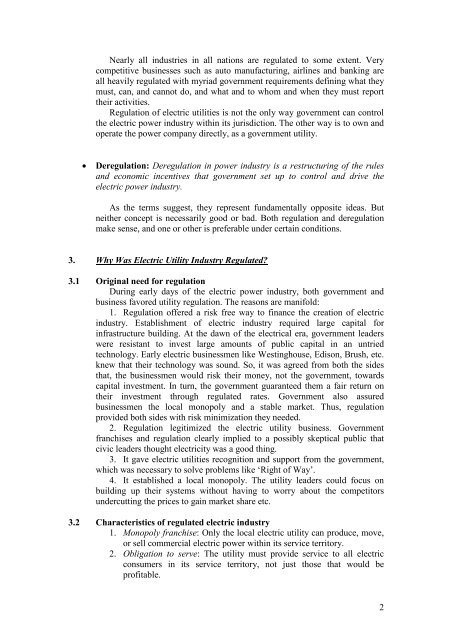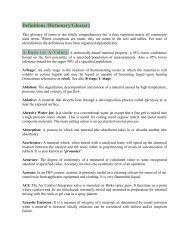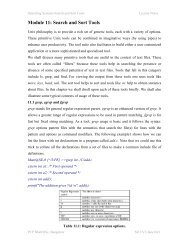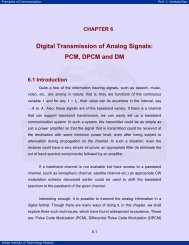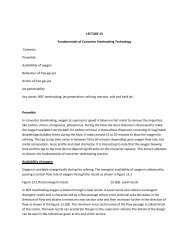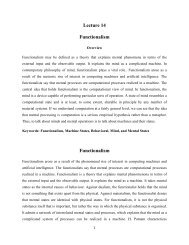Introduction to Deregulation in Power Industry - nptel
Introduction to Deregulation in Power Industry - nptel
Introduction to Deregulation in Power Industry - nptel
You also want an ePaper? Increase the reach of your titles
YUMPU automatically turns print PDFs into web optimized ePapers that Google loves.
Nearly all <strong>in</strong>dustries <strong>in</strong> all nations are regulated <strong>to</strong> some extent. Very<br />
competitive bus<strong>in</strong>esses such as au<strong>to</strong> manufactur<strong>in</strong>g, airl<strong>in</strong>es and bank<strong>in</strong>g are<br />
all heavily regulated with myriad government requirements def<strong>in</strong><strong>in</strong>g what they<br />
must, can, and cannot do, and what and <strong>to</strong> whom and when they must report<br />
their activities.<br />
Regulation of electric utilities is not the only way government can control<br />
the electric power <strong>in</strong>dustry with<strong>in</strong> its jurisdiction. The other way is <strong>to</strong> own and<br />
operate the power company directly, as a government utility.<br />
• <strong>Deregulation</strong>: <strong>Deregulation</strong> <strong>in</strong> power <strong>in</strong>dustry is a restructur<strong>in</strong>g of the rules<br />
and economic <strong>in</strong>centives that government set up <strong>to</strong> control and drive the<br />
electric power <strong>in</strong>dustry.<br />
As the terms suggest, they represent fundamentally opposite ideas. But<br />
neither concept is necessarily good or bad. Both regulation and deregulation<br />
make sense, and one or other is preferable under certa<strong>in</strong> conditions.<br />
3. Why Was Electric Utility <strong>Industry</strong> Regulated?<br />
3.1 Orig<strong>in</strong>al need for regulation<br />
Dur<strong>in</strong>g early days of the electric power <strong>in</strong>dustry, both government and<br />
bus<strong>in</strong>ess favored utility regulation. The reasons are manifold:<br />
1. Regulation offered a risk free way <strong>to</strong> f<strong>in</strong>ance the creation of electric<br />
<strong>in</strong>dustry. Establishment of electric <strong>in</strong>dustry required large capital for<br />
<strong>in</strong>frastructure build<strong>in</strong>g. At the dawn of the electrical era, government leaders<br />
were resistant <strong>to</strong> <strong>in</strong>vest large amounts of public capital <strong>in</strong> an untried<br />
technology. Early electric bus<strong>in</strong>essmen like West<strong>in</strong>ghouse, Edison, Brush, etc.<br />
knew that their technology was sound. So, it was agreed from both the sides<br />
that, the bus<strong>in</strong>essmen would risk their money, not the government, <strong>to</strong>wards<br />
capital <strong>in</strong>vestment. In turn, the government guaranteed them a fair return on<br />
their <strong>in</strong>vestment through regulated rates. Government also assured<br />
bus<strong>in</strong>essmen the local monopoly and a stable market. Thus, regulation<br />
provided both sides with risk m<strong>in</strong>imization they needed.<br />
2. Regulation legitimized the electric utility bus<strong>in</strong>ess. Government<br />
franchises and regulation clearly implied <strong>to</strong> a possibly skeptical public that<br />
civic leaders thought electricity was a good th<strong>in</strong>g.<br />
3. It gave electric utilities recognition and support from the government,<br />
which was necessary <strong>to</strong> solve problems like ‘Right of Way’.<br />
4. It established a local monopoly. The utility leaders could focus on<br />
build<strong>in</strong>g up their systems without hav<strong>in</strong>g <strong>to</strong> worry about the competi<strong>to</strong>rs<br />
undercutt<strong>in</strong>g the prices <strong>to</strong> ga<strong>in</strong> market share etc.<br />
3.2 Characteristics of regulated electric <strong>in</strong>dustry<br />
1. Monopoly franchise: Only the local electric utility can produce, move,<br />
or sell commercial electric power with<strong>in</strong> its service terri<strong>to</strong>ry.<br />
2. Obligation <strong>to</strong> serve: The utility must provide service <strong>to</strong> all electric<br />
consumers <strong>in</strong> its service terri<strong>to</strong>ry, not just those that would be<br />
profitable.<br />
2


